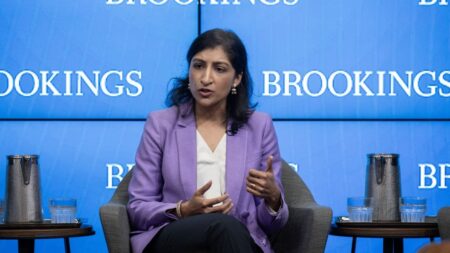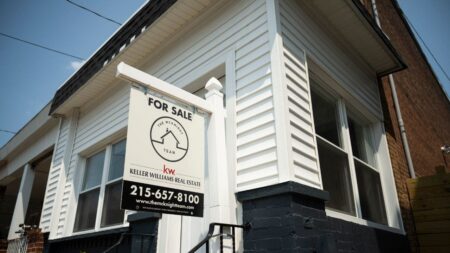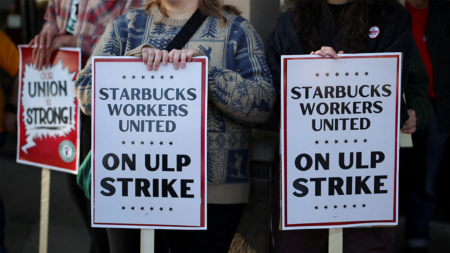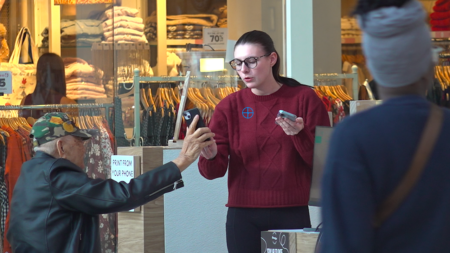By Lucia Mutikani
WASHINGTON (Reuters) – U.S. prices rose marginally in December, keeping the annual increase in inflation below 3% for a third straight month, bolstering expectations that the Federal Reserve will start cutting interest rates this year.
But the timing of the anticipated rate cut is uncertain, with the report from the Commerce Department on Friday also showing consumer spending surging at the end of 2023 as Americans splurged on goods and services over the holidays.
Financial markets have pushed the odds of a March rate cut to below 50% in a nod to the economy’s continued resilience. The U.S. central bank is expected to keep its policy rate unchanged at the current 5.25%-5.50% range at its meeting next week.
“The inflation trajectory is improving, giving the Fed leeway to cut rates this year,” said Jeffrey Roach, chief economist at LPL Financial (NASDAQ:) in Charlotte, North Carolina. “However, the Fed has further work to do and should not be tempted to declare ‘mission accomplished.'”
The personal consumption expenditures (PCE) price index increased 0.2% last month after dropping 0.1% in November, the Commerce Department’s Bureau of Economic Analysis said. Food prices rose 0.1% and the cost of energy products increased 0.3%.
In the 12 months through December, the PCE price index advanced 2.6%, matching November’s gain. The inflation readings were in line with economists’ expectations.
Excluding the volatile food and energy components, the PCE price index climbed 0.2% after rising 0.1% in November. The so-called core PCE price index increased 2.9% year-on-year, the smallest gain since March 2021, after rising 3.2% in November.
The Fed tracks the PCE price measures for its 2% inflation target. Monthly inflation readings of 0.2% over time are necessary to bring inflation back to target.
Core services prices excluding housing, the primary concern for policymakers, rose 0.3%. They increased 3.3% year-on-year after advancing 3.5% in November.
Some economists argue that core inflation is already on target. Measured on an annualized basis, core inflation rose at a 1.5% rate over the past three months and increased at a 1.9% pace in the last six months. The government reported on Thursday that core PCE inflation advanced at a 2.0% rate in the fourth quarter after a similar rise in the July-September period.
Economists said Fed officials were likely to place more weight on the fourth-quarter inflation reading as the quarterly data ironed out month-to-month volatility.
“Inflation at 2.0% on a quarter-on-quarter basis, for two quarters in a row, is a good reason to start cutting rates,” said Chris Low, chief economist at FHN Financial in New York. “The year-on-year core CPI at 2.9% gives the Fed cover to wait a few months longer and still fulfill (Chair Jerome) Powell’s prediction the Fed will cut rates before inflation reaches 2%.”
Stocks on Wall Street were mixed. The dollar slipped against a basket of currencies. U.S. Treasury prices fell.
STRONG CONSUMER SPENDING
Though prospects of a March rate cut have diminished, a reduction in borrowing costs is still expected by June. Since March 2022, the Fed has raised its benchmark overnight rate by 525 basis points.
Easing inflation along with rising wages from a tight labor market and households tapping their savings combined to boost consumer spending and support the overall economy.
Consumer spending, which accounts for more than two-thirds of U.S. economic activity, jumped 0.7% after rising 0.4% in November amid gains in both goods and services.
Spending on goods surged 0.9% as Americans stepped up purchases of new light trucks, clothing and footwear as well as recreational goods and vehicles. They also spent more on gasoline, furniture and household equipment.
Services outlays rose 0.6%, lifted by financial service charges, fees and commissions, housing and utilities, recreation, hospital and outpatient care, and gambling.
When adjusted for inflation, overall consumer spending increased 0.5% in December after a similar rise in the prior month. The solid increase in the so-called real consumer spending puts consumption on a higher growth path heading into the first quarter.
The Atlanta Fed started its tracking estimate for first-quarter GDP growth at a 3.0% rate.
“It is early to have a precise estimate of what first-quarter GDP will look like at this point, but the trajectory for consumers and across many other economic indicators looks at least decent late last year,” said Daniel Silver, an economist at JPMorgan in New York.
The data was included in the fourth quarter’s advance gross domestic product report published on Thursday. Consumer spending increased at a strong 2.8% rate last quarter, accounting for the bulk of the economy’s 3.3% growth pace.
The pace of growth in consumer spending is, however, likely to moderate in the months ahead. Personal income increased 0.3% in December after rising 0.4% in November.
Income at the disposal of households after accounting for inflation and taxes rose 0.1% after a solid 0.5% increase in November. As a result, some of the surge in spending was funded from savings. The saving rate dropped to a one-year low of 3.7%, from 4.1% in November.
Lower-income households are believed to be using credit cards to finance purchases. But higher borrowing costs are making it harder for some to keep up with their debt payments.
A reduction in government money flowing to household is also anticipated. While these factors could slow spending, economists do not expect the economy to slide into recession this year as lower inflation boosts household purchasing power. Rising stock market prices were also seen underpinning spending.
“We continue to expect a solid consumer spending performance in 2024, but momentum may be a little more subdued than the robust 2.2% advance in 2023,” said Gregory Daco, chief economist at EY-Parthenon in New York.
Read the full article here












